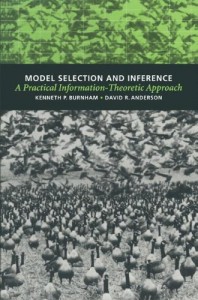This book is unique in that it covers the philosophy of model-based data analysis and a strategy for the analysis of empirical data. The book introduces information theoretic approaches and focuses critical attention on a priori modeling and the selection of a good approximating model that best represents the inference supported by the data.Kullback-Leibler Information represents a fundamental quantity in science and is Hirotugu Akaike's basis for model selection. The maximized log-likelihood function can be bias-corrected to provide an estimate of expected, relative Kullback-Leibler information. This leads to Akaike's Information Criterion (AIC) and various extensions. These are relatively simple and easy to use in practice. The information theoretic approaches provide a unified and rigorous theory, an extension of likelihood theory, an important application of information theory, and are objective and practical to employ across a very wide class of empirical problems.Model selection, under the information theoretic approach presented here, attempts to identify the (likely) best model, orders the models from best to worst, and measures the plausibility ('calibration') that each model is really the best as an inference. Model selection methods are extended to allow inference from more than a single 'best' model.The book presents several new approaches to estimating model selection uncertainty and incorporating selection uncertainty into estimates of precision. An array of examples is given to illustrate various technical issues.The is an applied book written primarily for biologists and statisticians using models for making inferences from empirical data. People interested in the empirical sciences will find this material useful as it offers an alternative to hypothesis testing and Bayesian approaches.Dr. Burnham has worked as a statistician applying and developing statistical theory in several areas of life sciences, especially ecology and wildlife, most often in collaboration with subject area specialists. He is the recipient of numerous professional awards including Distinguished Achievement Medal from the American Statistical Association, Section on Statistics and the Environment, and Distinguished Statistical Ecologist Award from INTECOL (International Congress of Ecology), and he is a Fellow of the American Statistical Association.Dr. David Anderson is a Senior Scientist with the Biological Resources Division within the U.S. Geological Survey and a professor in the Department of Fishery and Wildlife Biology. He is the recipient of numerous professional awards for scientific and academic contributions. 'Burnham and Anderson (eschew) P-values completely and (focus) entirely on how to decide when a model or models adequately fits the data. In essence, this is what an ecologist wants to know-how do predictive models work? This simple categorization, however, belies the conceptual richness that Burnham and Anderson present in their book, and its importance.' (Ecology)
Model selection and inference
Sobre
Talvez você seja redirecionado para outro site












